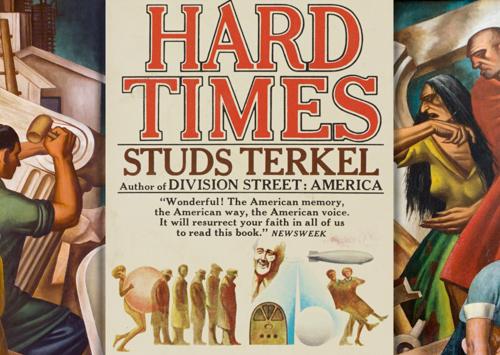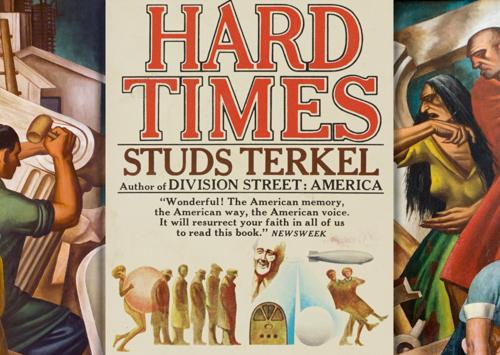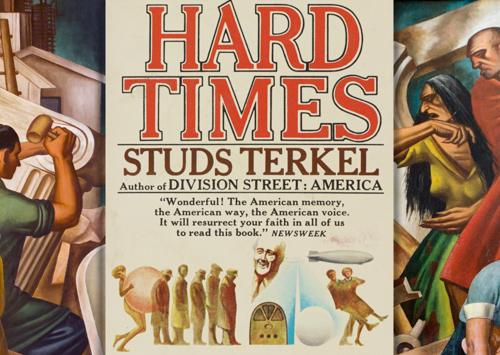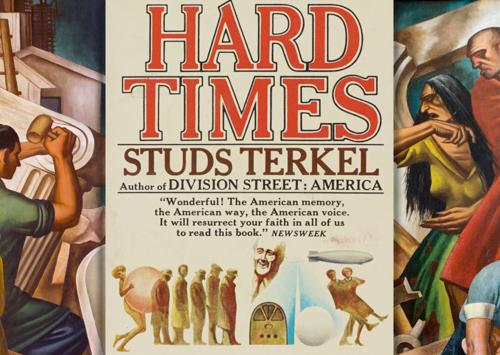Listen to New Voices on Studs Terkel our partnership with 826CHI-here! Read the Story
Showing 1 - 15 of 17 results
-
Terkel comments and presents "Hard Times: an Oral History of the Great Depression"; Chapter 9
1971 Presenting "Hard Times: An Oral History of the Great Depression" Chapter 9: God Bless the Child. In this section, interviewees are children that grew up during the Great Depression they talk about their experiences. Jane Yoder and her son Tom Yoder discuss the shame that can accompany poverty and the importance of warmth and food over all else. Bob Leary is a cab driver that talks about his father's lack of self-confidence even when able to find work. Daisy Singer remembers the need to keep up appearances.
-
Terkel comments and presents "Hard Times: an Oral History of the Great Depression"; Chapter 3
1971 Presenting "Hard Times: An Oral History of the Great Depression" Chapter 3: Big Business & A Portrait of Two Women. William Benton credits Pepsodent's survival of the Great Depression to Amos 'n Andy. Arthur Robertson talks about the initial aftermath of the 1929 crash as a Wall Street businessman. Sidney Weinberg discusses the confusion on Wall Street after the crash and praises FDR's programs. Jimmy McPartland talks about the importance of working and the success of WPA to boost morale.
-
Terkel comments and presents "A search for innocence" a monologue with Rose a teenager of St. Timothy Episcopal Church, Chicago
1970 Studs Terkel discusses life in the Vietnam era with children from Father Charles Pond's St. Timothy Episcopal Church Parish in Chicago. Rose is the featured speaker at 16 years of age she is no longer in school but is very well spoken. Acknowledging that people with mental illnesses are not always able to make sound decisions which are needed for individuals to make group decisions. She sees one of the problems in the world being that people are losing their individuality to a group mentality.
-
Russell Baker reads from and discusses his book "The Good Times"
Sep. 21, 1990 Back in his day, there was no journalism school, explained Russell Baker. He spent time with the police and that's how he often got his stories about the underclass or the superfluous. Baker pointed out when a paper didn't want to print one of his stories, Baker was told the subject matter was in poor taste.
-
Newton Minow discusses broadcasting
Jan. 11, 1964 Interviewing Newton Minow, Chicago lawyer and chairman of the Federal Communications Commission. He discusses broadcasting as a public service and spends a great deal of time on the history of commercials and how they changed over time.
-
Muriel Gardiner discusses her books "Code Name Mary" and "The Deadly Innocents"
Nov. 26, 1984 Muriel Gardiner's background and her time spent in Austria are the topics of "Code Name 'Mary': Memoirs of an American Woman in the Austrian Underground". With her book, "The Deadly Innocents: Portraits of Children Who Kill," Gardiner studies the lives of 10 kids who kill or attempt to kill.
-
Inteviewees discuss a variety of topics from the Hard Times: an Oral History of the Great Depression program; excerpts part 2
Excerpts from different episodes of "Hard Times: an Oral History of the Great Depression". Bonnie Laboring Boy: Joe Morrison talks about generational differences in laborers. Evelyn Finn talks about trying to unionize at clothing factories. Two Strikes: Jose Yglesias talks about strikes in cigar factories and the lifelong stigmas of strikebreakers. Bob Stinson discusses working at General Motors and the sit-down strike. The Farmer is the Man: Oscar Heline explains farmer's actions in response to farm foreclosures.
-
Inteviewees discuss a variety of topics from the Hard Times: an Oral History of the Great Depression program; excerpts part 1
Excerpts from different episodes of "Hard Times: an Oral History of the Great Depression". A Fairy Tale: Montage of young voices that talk about their parents' stories of surviving the Depression. The March: Jimmy Sheridan talks about what life was like on the rails as part of the Bonus March. Born Losers: Ed Paulsen discusses trying to find work in San Francisco and upon failing, marching to City Hall, which then led to rioting with the police. Hard Travelin': Pauline Kael remembers her mother feeding beggars that came to the back door.
-
Interview with Raleigh Campbell, Nan Hardin and Johanna Saylor ; part 3
1964 Interviewing Raleigh Campbell of the Council of Southern Mountains, also Nan Hardin and Johanna Saylor: "Appalachian in Chicago"
-
Horace Cayton discusses his book "Long Old Road" ; part 1
Sep. 7, 1966 Content Warning: This conversation includes racially and/or culturally derogatory language and/or negative depictions of Black and Indigenous people of color, women, and LGBTQI+ individuals. Rather than remove this content, we present it in the context of twentieth-century social history to acknowledge and learn from its impact and to inspire awareness and discussion. In "Long Old Road: An Autobiography," Horace Cayton talks about growing up in Seattle in a well to do, mostly white neighborhood. Cayton's grandfather was the first Black man elected to the U.S.
-
Discussing the books written by Nat Hentoff for young people
Apr. 28, 1982 Discussing the books written by Nat Hentoff for young people: "The First Freedom: The Tumultuous History of Free Speech in America," and the novel, "Does This School Have Capital Punishment?" Includes oral reading from the books.






